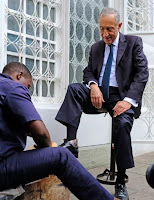The
Italian energy company ENI, in coordination with Mozambique’s National
Hydrocarbon Company (ENH), plans to launch on Tuesday the Floating Liquefied
Natural Gas (FLNG) unit that has been under construction, at the naval shipyard
of Samsung Heavy Industries, in the South Korean city of Busan, since March
2018.
Cited
by Radio Mozambique, project manager Luca Faccenda said the hull of the unit
“is particularly important since it will contain the LNG. This is the ship that
will produce the liquefied gas, and that liquefied gas will remain stored on
board the ship” . The hull is 43 metres long and 66 metres
wide. Its storage capacity is 234,000 cubic metres. The annual production from
this unit should be 3.4 million tonnes of LNG. “We are ready to launch the hull into the
water, which is a very specific activity for a ship with these
characteristics”, said Faccenda. It will take many hours, starting on Monday
night (Korean time), and ending at about 08.00 on Tuesday. When the vessel is complete and fully
tested, it will be towed to the Mozambique Channel, where it will float above
the Coral South gas field, in Area Four of the Rovuma Basin, off the coast of
the northern province of Cabo Delgado.The unit should be taken to Mozambique by
late November 2021, and the LNG production is expected to begin in 2022. This
will be the first of the various Rovuma Basin LNG projects to start production. The main participant in Area Four is
Mozambique Rovuma Ventures, a partnership between ENI, the US oil and gas giant
ExxonMobil and the China National Petroleum Corporation (CNPC), which together
control 70 per cent of the undertaking. The remaining 30 per cent are divided
equally between ENH, Galp Energia of Portugal, and Kogas of South Korea.








